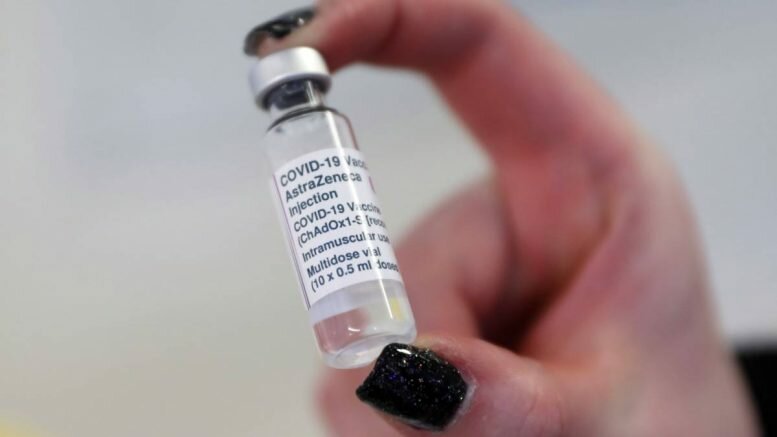An overview of the current AstraZeneca vaccine situation in Europe.
The latest
On Thursday, March 11, 2021, Denmark suspended the use of the AstraZeneca vaccine (developed in collaboration with the University of Oxford) completely. Some other European countries followed suit.
This prompted an investigation by the European Medicines Agency (EMA), which held a press conference on Thursday, March 18 – one week after Denmark’s decision. During the conference, the EMA stated that the AZ vaccine was “safe and effective” and concluded that the benefits outweigh the risks. It could not, however, rule out a link between the vaccine and blood clots; a possibility they would continue to investigate.
But just a few hours earlier, the Oslo University Hospital (Rikshospitalet) confirmed a link with blood clots.
The Norwegian report wasn’t taken into consideration by the EMA before the press conference, because the Agency only reviewed studies released before March 18 in its report.
So, what do we know so far? Read on for the full lowdown on AstraZeneca and COVID-19 vaccines in Europe. An analysis of the March 18 press conference is also below.
COVID-19 vaccines
There are several COVID-19 vaccines on the market, developed just a year after the pandemic was declared.
It’s important to remember that no vaccine exists (COVID-19 or not) that doesn’t carry some risk of side effects.
WHO approvals
The WHO issued emergency approval for use of the following vaccines (in chronological order):
- Pfizer-BioNTech (approved Dec 31)
- Serum Institute of India Covishield (approved Feb 15)
- AstraZeneca (approved Feb 15)
Seven others are still undergoing the Emergency Use Listing approval process:
- Moderna (earliest exp. in March)
- Johnson & Johnson’s Janssen (earliest exp. in March)
- Sinopharm (earliest exp. in March)
- Sinovac (earliest exp. in March)
- CanSinoBio (earliest exp. in April)
- Novavax (to be planned in April based on company request)
- Sputnik (will be determined when all data is submitted)
A number of vaccines have been rejected by the WHO.
European approvals
The European Commission currently lists four approved vaccines for European citizens:
- Pfizer-BioNTech
- Moderna
- AstraZeneca
- Johnson & Johnson’s Janssen
United States approvals
In the United States, three vaccines are currently approved and recommended:
AstraZeneca is not currently approved in the US. Along with Novavax, the AstraZeneca vaccine has to complete large-scale clinical trials to get potentially approved.
What is happening with AstraZeneca in Europe?
January 2021: Questions are raised about AstraZeneca’s effectiveness for older adults
Starting in January, AstraZeneca faced questions regarding its vaccine’s effectiveness on the older population. German newspapers reported on January 25 that the vaccine would probably not be approved by the EU for use on patients over 65 years of age. According to Handelsblatt, the German authorities estimated that AstraZeneca’s vaccine only has an 8% effect on elderly patients.
But the company stood by its vaccine, issuing a statement the same day: “In November, we published data in the medical journal The Lancet which showed that the vaccine had a good effect on older adults. 100% of older adults received the necessary antibodies after the second dose.”
The EMA authorized the AstraZeneca vaccine on January 29, 2021. Though the vaccine’s effect on the older population was somewhat unclear, the vaccine was approved for all, with the EMA report stating:
“Most of the participants in these [approval] studies were between 18 and 55 years old. There are not yet enough results in older participants (over 55 years old) to provide a figure for how well the [AstraZeneca] vaccine will work in this group. However, protection is expected, given that an immune response is seen in this age group and based on experience with other vaccines; as there is reliable information on safety in this population, EMA’s scientific experts considered that the vaccine can be used in older adults.”
Despite the EMA report, from early February, Norway and Sweden among several other countries, advised against the use of the AZ vaccine on people aged 65 and up.
February 12: Two Swedish regions suspend use of AZ vaccine due to side effects
On February 12, AstraZeneca vaccination was fully stopped in the Sörmland region southwest of Stockholm and the Gävleborg region about 200 km north of Stockholm. The decision came after 100 out of 400 vaccinated people in Sörmland reported what they suspected to be side effects, such as fever.
AstraZeneca was surprised by the high proportion of symptoms.
“It does not fit what we have seen”, Andreas Heddini, medical director of AZ in the Nordic region, noted.
He said that studies have shown about 10% of people get side effects of the type that were reported.
March 6: Woman in her 30s dies after an acute illness ten days following AZ vaccination
The woman died on March 6 in Tynset, according to municipal chief physician Tor Halvor Tuveng-Bjørnstad.
He told NTB that the Municipality “routinely” connected the death with the vaccination because the vaccination took place ten days before the death.
“We are not aware that she had any underlying diseases,” he said.
She died of a brain hemorrhage.
March 11: Denmark brings bombshell decision to fully suspend the AstraZeneca vaccine. Other countries, including Norway, follow
“Denmark is putting the use of AstraZeneca’s vaccine on hold after several vaccinated people got blood clots”, Prime Minister Mette Frederiksen said on March 11.
“The health authorities have, due to precautionary measures, suspended vaccination with AstraZeneca following a signal of a possible serious side effect in the form of fatal blood clots. It is currently not possible to conclude whether there is a connection. We act early, it needs to be thoroughly investigated” Minister of Health Magnus Heunicke wrote on Twitter.
Five other countries immediately decided to stop the use of AstraZeneca’s vaccine, following the same line as Denmark. These were Austria, Estonia, Lithuania, Latvia, and Luxembourg.
March 11: Norway on the AstraZeneca vaccine
Later in the day, Norway also suspended use of the AstraZeneca vaccine.
“We are waiting to see if there is any connection between the vaccination and these cases of blood clots,” infection control director Geir Bukholm at the National Institute of Public Health (FHI) noted.
Technical director of the Norwegian Medicines Agency Steinar Madsen told NTB: “We will go through all the side effects reports that may have to do with blood clots”. Madsen added, “We are also looking at individual patients to see if there are conditions that allow them to have a greater risk.”
Prime Minister Erna Solberg (H) said that she hopes the uncertainty surrounding AstraZeneca’s corona vaccine will be clarified quickly. She noted that the issue would delay the vaccination in Norway.
“It will prolong the time necessary for us to be fully vaccinated. But I think this will be clarified quickly,” Solberg told VG.
March 11: AstraZeneca, British foreign secretary respond to the waterfall decisions
“Patient safety is the highest priority for AstraZeneca. The supervisory authorities have clear and strict efficacy and safety requirements for the approval of all new drugs, and that includes our vaccine.
“The safety of the vaccine has been studied extensively in clinical third-phase studies, and peer-reviewed data confirm that the vaccine is generally well-tolerated,” AstraZeneca wrote in a comment to NTB.
The company emphasized that they are aware of the Danish investigation.
British Foreign Secretary Dominic Raab also told NTB that the British feel very confident that AstraZeneca’s vaccine is safe.
Raab visited Oslo where he held a press conference with Foreign Minister Ine Eriksen Søreide (H). Raab stated:
“I am aware of the situation here. We have done all the required examinations in the UK, and we are very confident that it is safe to take the vaccine. But we know that we must follow the processes in each country when it comes to security, and we, of course, have respect for the Norwegian approach.”
The European Medicines Agency additionally addressed the situation on the same day. They stated that they believe the AstraZeneca vaccine can still be used while the investigation into side effects and blood clots is underway.
European health authorities began investigating whether there may be any connection between the AstraZeneca vaccine and the blood clots.
March 13: Three health workers are admitted to Oslo University Hospital, possibly related to the AstraZeneca vaccine
The hospital admissions were due to complications related to blood clots that allegedly occurred after they received the AstraZeneca vaccine.
The three people admitted were all under the age of 60.
March 13: Severe allergic reaction added to the list of AstraZeneca side effects
According to the EMA, several probable links between the vaccine and severe allergic reactions have been discovered in the UK.
Therefore, the EMA recommended that the product information be updated to note that the vaccine can cause severe reactions, specifically anaphylactic and hypersensitive reactions.
March 13: Norwegian Medicines Agency warns skin bleeding after AstraZeneca vaccine can be serious
Several younger people who have received the AstraZeneca vaccine reported major or minor skin bleeding.
“It can be a serious sign of a reduced number of platelets,” Sigurd Hortemo in the Norwegian Medicines Agency said at an urgent press conference in collaboration with the FHI.
Both the Norwegian Medicines Agency and the FHI asked health workers under the age of 50 to pay special attention to side effects after the vaccine.
“I would say that these are extremely rare incidents, and this vaccine has been used on tens of millions of people, and apart from the cases in Norway, Denmark, and Austria, no such incidents have been reported,” Hortemo told TV 2.
March 13: AstraZeneca rejects claims that its vaccine increases the risk of blood clots, starts review of all safety data
AstraZeneca press manager Christina Malmberg Hëgerstrand noted that the company performed an analysis of safety data after more than 17 million vaccine doses have been administered.
The analysis has not shown signs of an increased risk of blood clots in the legs or lungs or a reduction in the number of platelets in the blood.
The statement from AstraZeneca comes after the FHI and the Norwegian Medicines Agency convened an emergency press conference in the wake of three health workers being admitted to the Oslo University Hospital with a blood clot after being vaccinated with a vaccine from AstraZeneca.
“The reported numbers of these types of events for AstraZeneca’s COVID-19 vaccine are not greater than the number that would have occurred naturally in the unvaccinated population,” Hëgerstrand wrote.
AstraZeneca has started a review of all safety data.
March 14: One of the health workers admitted to Oslo University Hospital dies
One of the three health workers who were admitted to Rikshospitalet on March 13 after receiving the AstraZeneca vaccine passed away a day later.
“She received all the intensive care we could provide at Rikshospitalet,” chief physician Trine Kåsine at Oslo University Hospital said on Monday.
The woman was employed at the hospital in Lillehammer, newspaper Gudbrandsdølen Dagningen writes. She was under 50 years of age.
“The Norwegian Medicines Agency emphasizes that this is a rare disease situation. They have a very unusual combination of low platelet counts, blood clots in small and large vessels, and bleeding. Some cases of similar diseases have been reported in several other European countries,” Steinar Madsen of the Norwegian Medicines Agency stated.
March 16: Boris Johnson defends AZ vaccine
British Prime Minister Boris Johnson defended AstraZeneca after several countries put the use of its vaccines on hold. Johnson says vaccine regulation in the UK is among the strictest and most experienced in the world.
“It is believed that they [vaccines] are very effective in reducing not only hospitalizations but also serious illness and death,” the Prime Minister told the news agency PA.
March 16: WHO warns against vaccine panic saying “Countries should continue to vaccinate with AstraZeneca”
“People must not panic. For the time being, we recommend that countries continue to vaccinate with AstraZeneca,” WHO’s Head of Research Soumya Swaminathan noted.
She emphasized that no deaths have so far been attributed to any of the corona vaccines that have been used.
At this point, a number of countries in Europe have paused the use of the AstraZeneca vaccine, including Denmark, Norway, Austria, Estonia, Lithuania, Latvia, Luxembourg, Germany, France, Italy, Spain, Iceland, Ireland, the Netherlands, Bulgaria, and Sweden.
Countries outside of Europe, including Thailand and The Congo, have as well.
March 17: Norway’s FHI says it will make an independent assessment of the AstraZeneca vaccine
FHI’s chief Camilla Stoltenberg announced the information at a press conference on the corona situation.
“Regardless of what the European Medicines Agency and the Norwegian Medicines Agency come to, the National Institute of Public Health, which is responsible for the national corona vaccination program, will make an independent assessment of whether we will continue to offer this vaccine in the (vaccination) program in Norway,” Stoltenberg said.
Stoltenberg also said that it is important that Norwegian maintain confidence in the vaccination program and vaccines in the time ahead.
March 18: Oslo University Hospital finds that AstraZeneca vaccine was the cause of the blood clots
Researchers at the Oslo University Hospital report that a strong immune response after the AstraZeneca vaccine led to three health workers getting blood clots and one of them dying.
The findings became known on the morning of March 18, NTB reports.
“We have received findings that can explain our inpatients’ clinical course,” chief physician and professor Pål Andre Holme at Rikshospitalet said at an urgent press conference. “We believe this is important to put out, we have found a sensible explanatory model,” Holme said.
Holme led a group at the hospital that worked to find out why three health workers under the age of 50 were admitted with a severe blood clot after taking the AZ vaccine. The conclusion is now that a strong immune response after vaccination has led to blood clots.
According to Holme, the explanation is that the immune response led to the formation of antibodies that caused the platelets to act in a way that blood clots formed. At the same time, the antibodies contributed to platelets being removed from the circulation so that the people had a low number of platelets and thus also experienced bleeding.
“We believe this is the direct reason why we see this clinical picture,” Holme said at the press conference.
According to Holme, so far, no explanation has been found as to why some get this reaction and others do not. “We have theories, but we have nothing to suggest why some get it and others do not,” said Holme.
“We will now start looking at whether there are underlying factors or special predispositions. There is an enormous amount of work here,” Holme noted.
March 18: UK Medicines Agency says there is no link between the AstraZeneca vaccine and blood clots
The British Medicines and Healthcare products Regulatory Agency reports that it has not found any connection between blood clots and AstraZeneca’s COVID-19 vaccine – unlike the Oslo University Hospital.
The UK review says that the available information does not indicate that the vaccine leads to blood clots in the veins and that the benefits of the vaccine far outweigh the risks.
A more detailed assessment of reports of five specific and rare cases of blood clots in the veins of the brain in combination with a low number of platelets is still ongoing, the MHRA audit stated.
March 18: EMA says vaccine is safe and effective and can continue being used, but link with blood clots can’t be ruled out
An investigation by the European Medicines Agency (EMA), culminated in a press conference on Thursday, March 18 – one week after Denmark’s initial decision.
The EMA found that the AstraZeneca vaccine was “safe and effective” and concluded that the benefits outweigh the risks. It could not, however, rule out a link between the vaccine and blood clots; a possibility they would continue to investigate.
The recommendation for continued use came along with EMA director Emer Cooke saying, “If it was me, I would be vaccinated tomorrow”.
Dr. Sabine Straus, chair of the EMA’s Pharmacovigilance Risk Assessment Committee (PRAC), noted that the number of blood clots reported after vaccination was “lower than the expected in the general population.” “Moreover, because the vaccine is effective in preventing COVID-19 disease, which in itself is a cause of blood clots, it likely reduces the risk of thrombotic events overall,” she said. She also confirmed there was “no evidence of a quality or batch issue.”
While blood clots occur frequently in the general population, some reported cases stand out because several of the patients also had low platelet counts.
Norwegian research not assessed by EMA before conference
During a virtual Q&A session with journalists (which was briefly interrupted at one point due to technical difficulties), Ole Alexander Saue from Aftenposten asked whether the EMA has reviewed the Norwegian study.
“If there is a study that has come out today, we have not evaluated it yet. But it will be part of our monitoring of the situation. This is a temporary conclusion,” Dr. Straus answered.
The Norwegian Medicines Agency later confirmed to VG that the EMA had not yet assessed the Norwegian results from chief physician and professor Holme at Rikshospitalet.
“We have sent Holme’s theories to our representatives in PRAC today [March 18],” Sigurd Hortemo in the Norwegian Medicines Agency informed VG.
EMA warning opened for other vaccines
The press conference Q&A also opened further dialogue about COVID-19 vaccine side effects.
Bruno Waterfield from The Times raised a question about cases of ITP (immune thrombocytopenia) in the United States, where Pfizer and Moderna vaccines are more common, and whether the EMA is conducting wider investigations beyond AstraZeneca in such cases.
Dr. Straus responded that the committee highlighted a signal in all three vaccines concerning ITP. So, assessments have begun for vaccines other than AstraZeneca, as well.
Demographic risks discussed
Whether certain demographic groups are more at risk was also discussed.
Young women were mentioned as possibly being more affected by blood clots here, which would explain the discrepancy between Europe (more cases of blood clots and fewer vaccinations) and the UK (fewer cases of blood clots and more vaccinations – with a bigger percentage of older men vaccinated).
March 18: FHI says Norway will not continue using AstraZeneca vaccines at this moment
“We will thoroughly assess whether there is a connection between the vaccines and the cases of the disease. We take note of EMA’s assessment,” the FHI director Stoltenberg said.
“We will make an assessment at the end of next week,” she added, continuing, “The vaccination with AstraZeneca will continue to be on pause until we have a more complete picture of the situation.”
Stoltenberg also said that the decision on March 11 to stop vaccinating with the AstraZeneca vaccine was correct.
“It is important to pause when you are notified of serious incidents,” she emphasized.
March 19: Several countries resume use of AZ corona vaccine
Germany, Italy, France, Spain, Cyprus, Latvia, and Lithuania are among the countries that are resuming the use of AstraZeneca’s vaccine on the EMA’s recommendation.
Norway, Denmark, and Sweden are among the countries that will wait before using the AZ vaccine again until more studies have been done.
March 19: France recommends giving the AstraZeneca vaccine to people over the age of 55 only
French health authorities said they are changing their recommendation on the vaccine as serious, with rare blood clots so far being detected in people under 55 years of age.
French Prime Minister Jean Castex (55) is planned to be vaccinated today.
“I want to be vaccinated with this vaccine to show that we can have full confidence in it,” Castex said.
Continue following Norway Today for the latest developments of this situation.
Source: #Norway Today / #NorwayTodayNews
Do you have a news tip for Norway Today? We want to hear it. Get in touch at [email protected]






Be the first to comment on "Norwegian scientists say the AstraZeneca vaccine causes clots, the EMA says it’s safe. Here’s what we know"